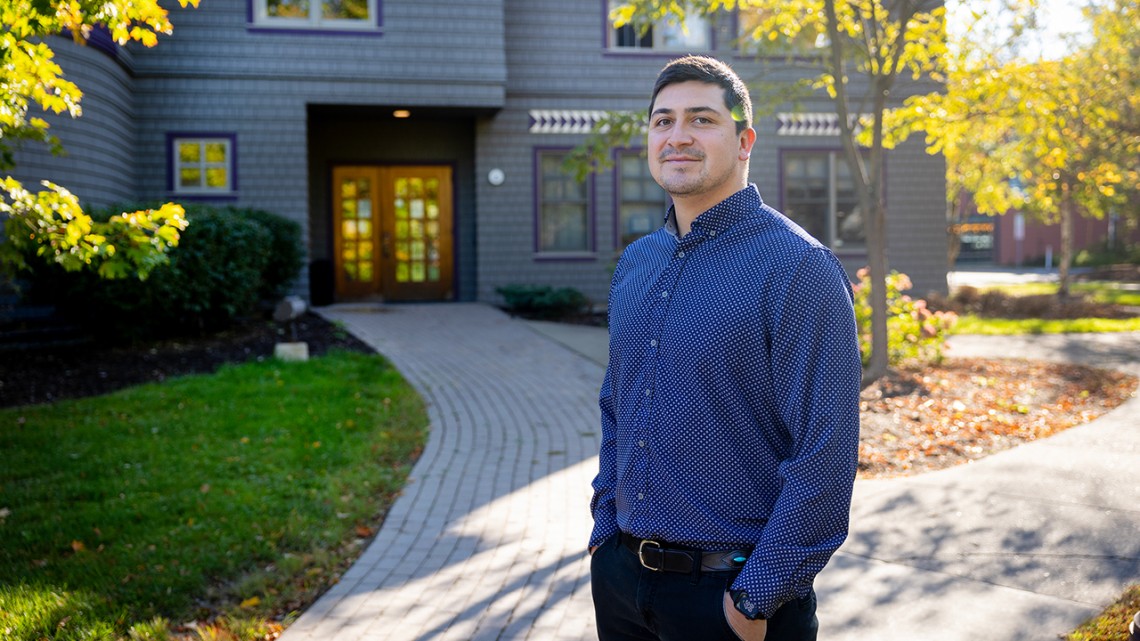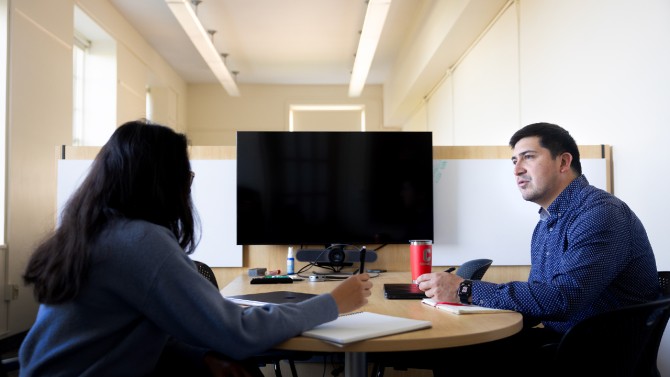
Michael Charles ’16, a citizen of the Navajo Nation and assistant professor, outside Akwe:kon, a residence hall devoted to Indigenous cultures, where Charles lived as an undergraduate at Cornell.
With research and data, professor empowers Indigenous communities
By Caitlin Hayes, Cornell Chronicle
In the midst of his doctoral work, Michael Charles ’16 thought he would leave academia – he couldn’t see a future in it that centered his advocacy for Indigenous communities like his own.
“At that point, I didn’t see where my goals fit,” said Charles, a citizen of the Navajo Nation and now assistant professor in biological and environmental engineering in the College of Agriculture and Life Sciences (CALS). “All through my Ph.D., I could feel the work I really wanted to do was going to be seen as not-engineering.”
Since then, Charles has forged a new path that combines his advocacy and his research. He uses computational modeling to provide Indigenous communities with data they can use to advocate for themselves – and he’s pushing the science of ecological modeling and sustainable engineering forward to better represent complex, dynamic situations and challenges.
In his lab’s current projects – all of which involve extensive collaboration with Indigenous communities – his team is quantifying the impacts of forced migration and climate change on Indigenous food systems for Tribal Nations across North America. They’re mapping the effects of land use and industry, such as mining, on air and water pollution for eight Indigenous communities in the Utah Valley. And they’re creating a searchable “atlas” of all the research conducted on Indigenous lands in Nunavik, a vast swath of land north of Quebec, to empower Inuit communities to make their own evidence-based decisions on research governance and allocating resources.
“We’re always asking, how can the data or information be useful to communities as a tool for self-determination or advocacy?” Charles said. “These are numbers and data that they can use for self-governance, or in a court trial, or in influencing public policy, or to tell the story of what they’re experiencing.”
Many of Charles’ research partnerships with Indigenous communities have been borne out of his advocacy. He’s worked with the International Indigenous Peoples’ Forum on Climate Change and is a longtime advocate for Indigenous representation in STEM through the American Indian Science and Engineering Society (AISES).
“It’s the personal relationships that are doing most of the work in these projects,” said Charles, who is also an engaged faculty fellow with the David M. Einhorn Center for Community Engagement. “We start with that foundation of trust and then try to figure it out together.”
Growing up, waking up
Charles grew up in Longmont, Colorado and was one of 18 in his high school class. He spent every vacation visiting family on the Navajo reservation in northern Arizona and New Mexico. But it wasn’t until he came to Cornell as a recipient of the prestigious Jacobs Scholarship in the College of Engineering that his curiosity about his heritage grew and his appreciation deepened.
At Cornell, Charles lived in Akwe:kon, the first university residence hall in the country devoted to North American Indigenous cultures. And he was involved in the American Indian and Indigenous Studies Program (AIISP) and the Cornell chapter of AISES. He started making more phone calls home, asking his family and elders more questions and talking about his community’s values and its challenges, both at home and in Ithaca.
“When you’re young, you don’t really know what questions to ask, but as I got older, I started to understand why it was important and that there was a lot of power in living in that community,” he said.
Charles’ undergraduate academic work also set the stage for his approach to community engagement. On a trip to India to implement a project he and two other students developed for a class, he realized how little they’d considered the values and knowledge of the local people.
“That was a big wake-up call for me,” Charles said. “I started thinking about how to challenge engineering as we’ve designed and built it, which means challenging the idea, the ego, of being all-knowing and always correct.”
Charles started his Ph.D. at The Ohio State University but grew frustrated with the narrowness of his discipline. After graduating, he stayed at Ohio State to complete a postdoc in comparative studies at The Newark Earthworks Center, where he started studying Indigenous food systems. He also held a fellowship through AISES where he explored pathways for Native entrepreneurs to start businesses on Navajo Nation.
Then, in 2021, Cornell called.
Charles was invited to apply to be a part of a new faculty cohort in CALS hired expressly to address challenges facing marginalized and disadvantaged communities.
As a fellow for AISES, he’d already had the idea of a startup that used research grants to provide nourishment for Indigenous communities while also doing research, but now he started to see how he could do that work at Cornell. “I’m very grateful to people who pushed me to apply, because now, every day, we get to figure out how to realize that vision.”
Building reciprocity, community
As much as possible, Charles approaches and imbues his research and outreach with values from his culture: reciprocity, balance and community.
“Within our culture, we’re very much taught within a reciprocity framework, a community framework, rather than any sort of individual-based goal,” he said. “When it comes to environmental engineering and design, we want to start thinking about how we give back to the landscapes, to nature, what we’re taking and receiving.”
Establishing this reciprocity is also an essential goal of his community work, which means the research itself often becomes one piece of a larger relationship. Sometimes the models he and his team want to produce are at odds with what the community has requested, Charles said. “So maybe we need to go in one direction to hit our research mark, but then another time we come back to the community to shape a project by what’s useful or urgent to them.”
Charles has tried to share his knowledge and skills with his Indigenous partners even when it’s unrelated to his research. This year, he helped an Indigenous nonprofit in Utah write grant applications that have raised more than $85,000 to hold powwows in the Utah Valley, for example.
One of the greatest rewards so far has been coming full circle to mentor Indigenous Cornell students, Charles said. He is an affiliate faculty of AIISP and serves as a faculty fellow for Akwe:kon and adviser for a number of Indigenous student groups. He said Indigenous students have been eager to think through how their academic work can help their communities and how their cultural perspectives add value.
“I think there’s a lot of opportunity for Native students to excel, as they start building these formal trainings through the institution and integrate it with some of their experiential knowledge, cultural teachings and histories,” Charles said. “The more we can invite them to bring their full minds and own knowledge systems, the more interesting new research we’re going to see.”
Media Contact
Get Cornell news delivered right to your inbox.
Subscribe


